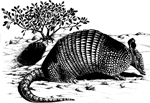Vertebrate Pest Conference: Proceedings

Vertebrate Pest Conference Proceedings: 9th (1980)
Date of this Version
March 1980
Document Type
Article
Abstract
Conditioned food or flavor aversion has been proposed as a method to stop coyote predation on sheep. The method entails treating sheep carcasses or meat baits with an emetic, lithium chloride (LiCl), and scattering them on sheep ranges. Theoretically, coyotes eat the baits, become ill, and subsequently desist from killing and eating sheep because they associate sheep flavor with sickness. In recent studies, coyotes have not formed prey aversions. Coyotes avoided baits because of LiCl flavor rather than prey flavor and prey killing aversions were not found. We conducted a study designed to find the best LiCl-prey flesh concentration to produce bait aversion in coyotes, and to test the transfer of bait aversion to a prey-killing aversion. Baits with 1 g LiCl per 500 g prey flesh produced the strongest aversion to untreated baits, but coyotes conditioned to avoid prey baits made at this concentration killed and ate live test prey as frequently as coyotes with no conditioning. The lack of transfer from bait aversion to prey-killing aversion suggests that LiCl bait aversion will not prevent coyote predation on livestock.

